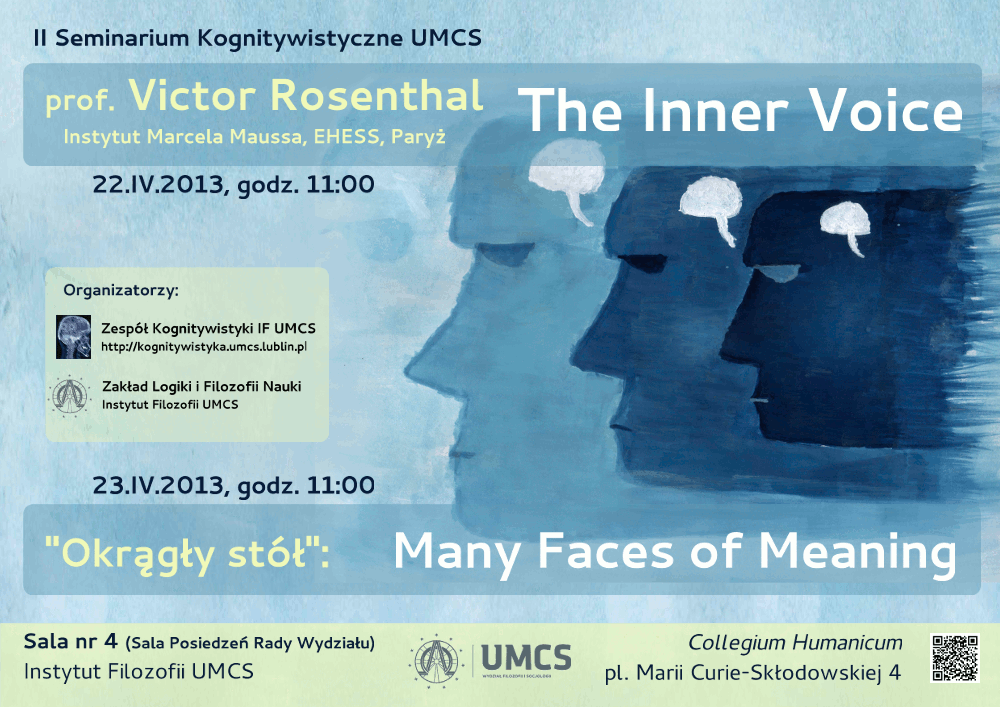![]() Prof. Victor Rosenthal, badacz z Institut Marcel Mauss przy National Center of Scientific Research i École des Hautes Études en Sciences Sociales w Paryżu będzie gościem II Seminarium Kognitywistycznego UMCS, które odbędzie się na Wydziale Filozofii i Socjologii w dniach 22-23 kwietnia 2013 r. (Sala Posiedzeń Rady Wydziału).
Prof. Victor Rosenthal, badacz z Institut Marcel Mauss przy National Center of Scientific Research i École des Hautes Études en Sciences Sociales w Paryżu będzie gościem II Seminarium Kognitywistycznego UMCS, które odbędzie się na Wydziale Filozofii i Socjologii w dniach 22-23 kwietnia 2013 r. (Sala Posiedzeń Rady Wydziału).
- 22.IV.2013, godz. 11:00: wykład The Inner Voice
- 23.IV.2013, godz. 11:00: Many Faces of Meaning: „okrągły stół” w ramach Seminarium Kognitywistycznego; uczestnicy (m.in.): Victor Rosenthal, Zbysław Muszyński, Artur Koterski, Maciej Rajewski, Piotr Konderak.
Abstrakt wystąpienia The Inner Voice:
In this talk I shall develop the idea of institution of psychic life via semiotic and expressive dynamics that crisscross and organize human life. To this end, I define a novel object of anthropological enquiry that nevertheless encompasses a range of intuitively familiar phenomena: the inner voice. This is the small voice that speaks to us, jeers, scorns, or cheers us up; the voice that resonates in our skull, mobilizes our (sub)vocal apparatus, and of which we are the main addressee. More importantly, this voice carries all the symbolic dimensions of human voice (agency, will, claim, identity) with the addition of being our intimate spokesperson. Beyond the paradox of having to tell oneself what one is supposed to know already, arise an array of phenomena that seem determinant for our very being human. Indeed, inner voice features the voice of the subject as a person and as a moral instance: since I talk to myself I entertain a dialogical relationship with myself, I am two-in-one, and I have to live up to the constraints of this coexistence (and to the pressure of the other voice). Inner voice also features what we called Alice’s workshop, i.e. medium, mnemotechnics, and field of integration and experimentation. This is the faculty for repeating, revising, rehearsing internally the normative, prescriptive, symbolic elements of our culture (language), whether in view of consolidation, or transformation, in view of experimenting with their alternative variants, or creating novel instances – i.e. the fiction. There is a functional duality in inner speech whereby it operates both as an agent of the social world (by the use of common language and of its cultural repertory) and as a vector of individuality (autonomy of attention, intimate voice and spokesperson). On the whole, the range of phenomena encompassing the use of inner voice goes far beyond a simple modality of speech, and it is argued that inner voice has become a genuine institution of human life, and as such, is an important vector and regulator of inner and social life.
Prezentację do wykładu można obejrzeć klikając tutaj
„Okrągły stół”: Many Faces of Meaning
Jednym z celów Seminarium Kognitywistycznego jest organizacja spotkań i dyskusji nad ideami, powszechnymi w kognitywistyce, choć ujmowanymi odmiennie w ramach różnych dziedzin kognitywistycznych. Takim podstawowym pojęciem nierozerwalnie związanym z ludzkim poznaniem („dogłębnie ludzkim”, jak pisze Zlatev), a w szczególności z językiem naturalnym jest znaczenie. Jackendoff (2002) pisze o znaczeniu jako o „świętym Graalu” lingwistyki, filozofii, psychologii, neuronauki i innych dyscyplin. W tym duchu chcemy się zastanowić nad rozmaitymi ujęciami znaczenia w: filozofii języka, umysłu, semiotyce (zwłaszcza semiotyce poznawczej), logice, językoznawstwie, psychologii, metodologii nauk, antropologii czy sztucznej inteligencji – mając nad uwadze cel, jakim jest wyjaśnianie aspektów (ludzkiego) poznania. Zaprezentowane spektrum podejść – ilustrujące inter- i multidyscyplinarność kognitywistyki – umożliwi poszukiwanie „wspólnego mianownika” w rozpatrywaniu problematyki znaczenia. Jednocześnie pozwoli uczestnikom odnieść się do typowych stanowisk zajmowanych w badaniach nad znaczeniem, np. internalistycznego/eksternalistycznego, realistycznego/konceptualistycznego, syntaksocentrycznego/opatego na użyciu i in.
Po prezentacji stanowisk zaproszonych gości (10-15 min.) będzie czas na dyskusję między uczestnikami „okrągłego stołu” oraz na odpowiedzi na pytania publiczności.
 Victor Rosenthal jest badaczem Instytutu Marcela Maussa, wspólnej inicjatywy CNRS (National Center of Scientific Research) oraz École des Hautes Études en Sciences Sociales; pełni też funkcję Research Fellow przy INSERM (National Institute of Health and Medical Research). Wykształcenie Victora Rosenthala obejmuje szerokie spektrum dziedzin, w tym: matematyka i filozofia (Uniwersytet w Tel Avivie), psychologia eksperymentalna (MA), kognitywna (PhD) (Université Paris VIII), psychologia (hab., Université René Descartes – Paris V), neurolingwistyka i neuropsychologia (Clinica Neurologica dell’Università di Padova) oraz psychologia poznawcza i modelowanie kognitywne (Center for Human Information Processing, University of California, San Diego) Obecnie zainteresowania badawcze kieruje ku psychologii kulturowej, antropologii semiotycznej (semiotyczny wymiar kształtowania ludzkiego doświadczenia), biologii teoretycznej, filozofii i epistemologii psychologii. W szczególności zajmuje się ekspresywnością [expressivity] w percepcji, pojęciem „głosu wewnętrznego” jako wektora i regulatora życia wewnętrznego i społecznego oraz synestezją i intermodalnością. Jest on autorem licznych artykułów i rozdziałów w monografiach poświęconych m.in modelowaniu kognitywnemu, neuropsychologii poznawczej, neurolingwistyce (szczegóły w CV, poniżej).
Victor Rosenthal jest badaczem Instytutu Marcela Maussa, wspólnej inicjatywy CNRS (National Center of Scientific Research) oraz École des Hautes Études en Sciences Sociales; pełni też funkcję Research Fellow przy INSERM (National Institute of Health and Medical Research). Wykształcenie Victora Rosenthala obejmuje szerokie spektrum dziedzin, w tym: matematyka i filozofia (Uniwersytet w Tel Avivie), psychologia eksperymentalna (MA), kognitywna (PhD) (Université Paris VIII), psychologia (hab., Université René Descartes – Paris V), neurolingwistyka i neuropsychologia (Clinica Neurologica dell’Università di Padova) oraz psychologia poznawcza i modelowanie kognitywne (Center for Human Information Processing, University of California, San Diego) Obecnie zainteresowania badawcze kieruje ku psychologii kulturowej, antropologii semiotycznej (semiotyczny wymiar kształtowania ludzkiego doświadczenia), biologii teoretycznej, filozofii i epistemologii psychologii. W szczególności zajmuje się ekspresywnością [expressivity] w percepcji, pojęciem „głosu wewnętrznego” jako wektora i regulatora życia wewnętrznego i społecznego oraz synestezją i intermodalnością. Jest on autorem licznych artykułów i rozdziałów w monografiach poświęconych m.in modelowaniu kognitywnemu, neuropsychologii poznawczej, neurolingwistyce (szczegóły w CV, poniżej).
kontakt: Piotr Konderak, kondorp[at]bacon.umcs.lublin.pl
<< Powrót do: Seminarium Kognitywistyczne

